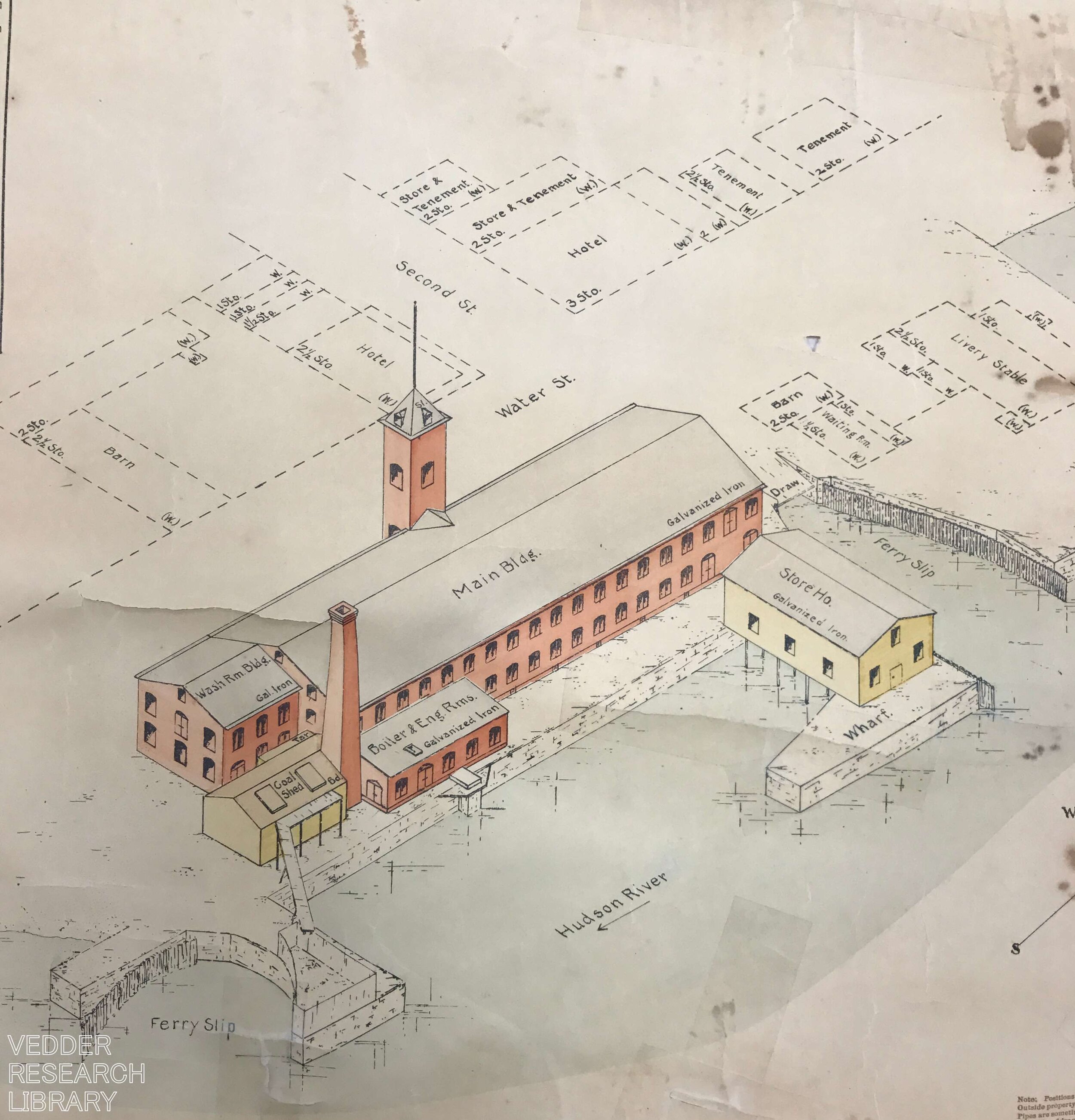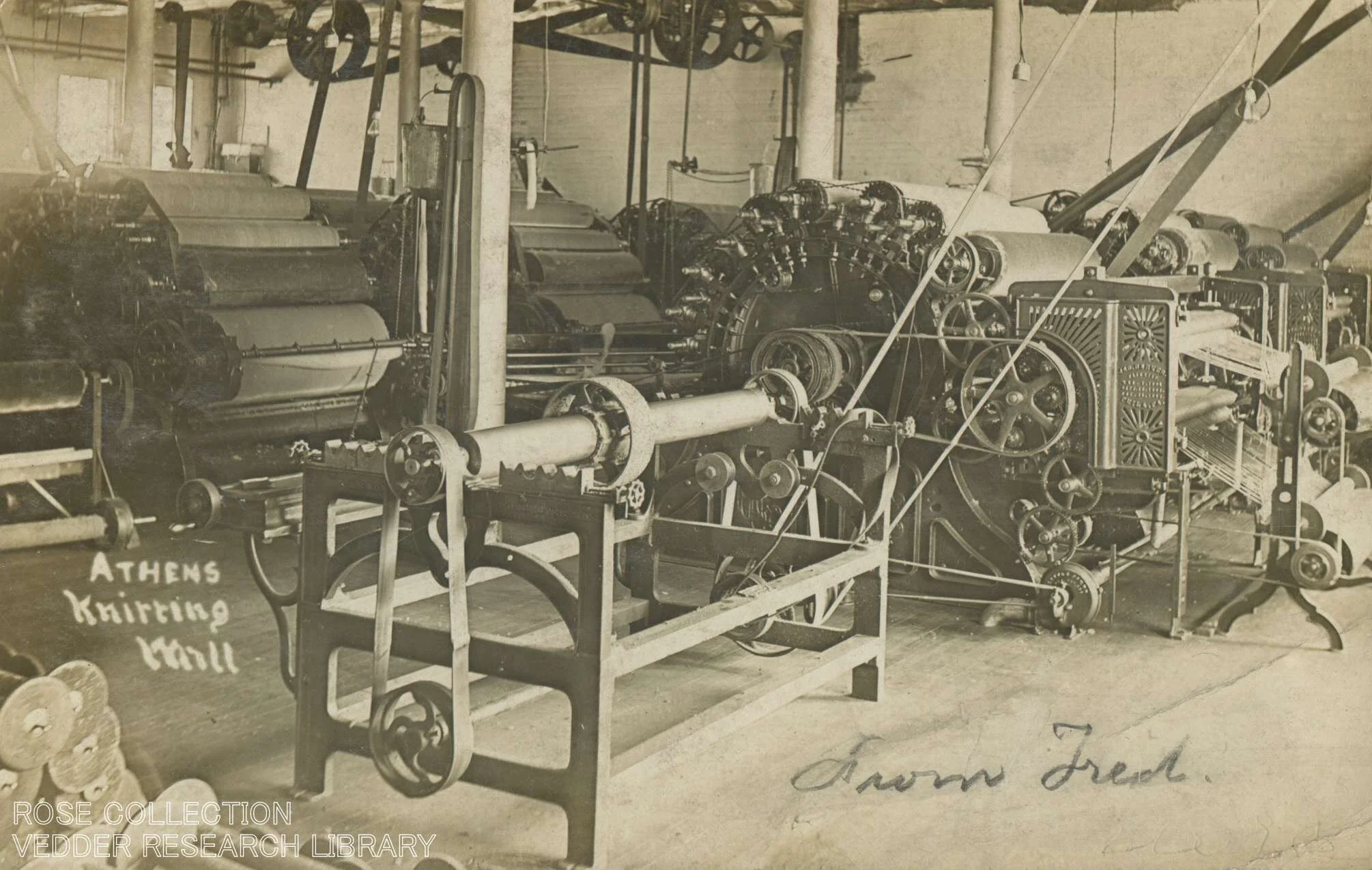Kadin Brothers Pocketbook Factory
The riverfront at Athens is celebrated by residents and visitors alike as its most beautiful asset, but its modern appearance and recreation-oriented amenities bely the riverfront’s original function as the epicenter of all of the Village’s industrial ventures. The Athens Riverfront Park, one of the Village’s cornerstone features, is a prime example of this relatively recent transformation. At the park today folks can enjoy weekly summer concert series, an annual festival, quality drinks and food at nearby restaurants, and quick access by boat via the village docks to attractions such as the Hudson-Athens Lighthouse.
Old timers and lifelong residents will of course recall when this was most certainly not the case, pointing to a time over forty years ago when the riverfront park was merely the footprint of the looming Kadin Brothers Pocketbook Factory. Where welcoming picnic tables now offer shaded seats below the park’s trees there once loomed towering brick walls and a bell tower that left Water Street in shadow for half the day. From within emitted the hum and clang of industrial sewing machines, carding machines, looms, and packing rooms where residents from Athens and Hudson found steady work in shifts manufacturing products for a ready market in New York City.
Plan of the Athens Knitting Mill in 1896.
The Pocketbook Factory, as it is still recalled by many residents, has a story much older than that of the the Kadin Brothers firm which operated the Athens plant from 1937-1968. It begins in the 1890s when large regional manufacturing concerns dominated America’s economic landscape. This factory, which was originally known as the Athens Knitting Mill, sprang up as a textile plant around 1896. It replaced several old storehouses and expanded a historic wharf at that location, and was ideally sited hard by the slip of the Hudson-Athens Ferry. Its location presented an opportunity to source labor from not only Athens, but the City of Hudson as well.
It is not known what was originally manufactured in the Athens Knitting Mill, but an interior postcard of the Mill taken sometime before 1910 shows some of the belt-driven carding machines on one of its floors, indicating the processing of wool for garments or blankets. A dock offered ready access for barges bringing raw materials and taking away finished products, a handy feature which probably factored in the Mill being sited there. Generations of Athenians found work in the mill on the manufacturing floors, in the machine shops, and in management roles. Despite its formidable size, the Knitting Mill was still only one of several manufacturing and service industries that made Athens a robust working community for the first 150 years of its existence.
Interior of the Athens Knitting Mill showing some belt-driven carding machines circa 1910.
The Knitting Mill was offered for sale in the mid-1930s and Kadin Brothers, a firm based in New York City, saw an opportunity for expansion. They purchased the plant and moved their manufacturing operations up the river to Athens. Kadin Brothers existed as a company 1924 to 1992, touting international designers and a “Made in the USA” tag on their products which were mainly women’s handbags and pocketbooks. The company’s products competed successfully for decades against a slew of other affordable and fashionable women’s handbags while also offering frame bags and other items of a more utilitarian function that sported the company’s sensitivity to the latest styles. In the 1940s and ‘50s the wives of several Athens Village officials were always pleased around the holidays to find a complimentary handbag from company management on their doorsteps.
When Kadin Brothers purchased the old Knitting Mill building it was in desperate need of upgrades. An announcement from a local paper in 1937 noted that the machinery needed to manufacture handbags was being shipped up the Hudson from a decommissioned Kadin Bros. plant in Phillipsburg, New Jersey. Local contractors were hired to make improvements to the physical plant and electrical systems, and by the end of the year the Athens factory was employing 150 women and 50 men - a welcome new source of employment in the depths of the Depression. These employees and the staff of a similarly scaled plant in Hudson were unionized, and the successfully fought for pay raises the year after the factories commenced operation.
The Athens Knitting Mill circa 1915.
Like countless manufacturing firms across the country, competition from cheaper overseas labor and the desire of managers to increase profitability led to the closure of the Athens plant in 1969. Kadin Brothers’ operations were consolidated with the Hudson plant, and the Athens Knitting Mill Building went dormant. The Village seized the factory for back taxes in the mid-1970s, and despite many ideas for repurposing the building (including an offer to convert it to apartments in 1975) no feasible plan came to fruition. Finally the Village decided to have the building demolished, and a contract crew removed the structure and components in 1978 at no cost to the community, leaving only a large concrete slab that would remain for several more years.
By Jonathan Palmer, Greene County Historian.
Questions can be directed to Jon at archivist@gchistory.org



